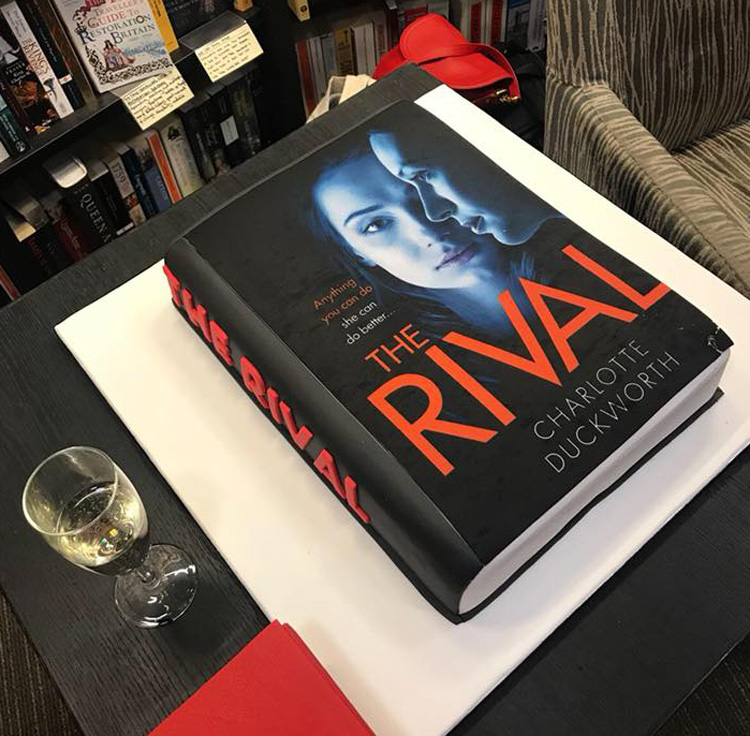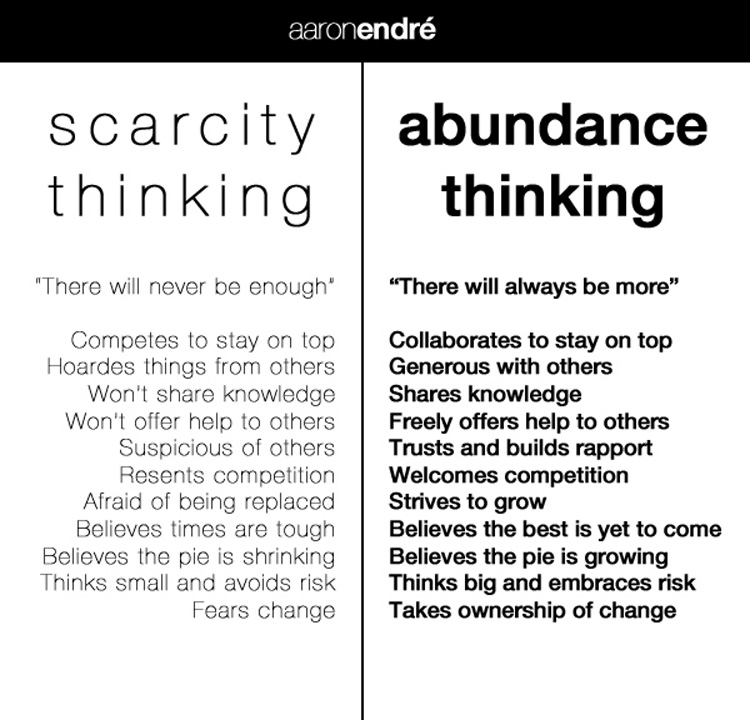What a year of being published has taught me
Last week the paperback of The Rival finally came out – a momentous moment! It’s more than a year since my hardback was released and it’s really lovely to know that the book is properly ‘out there’ now, and hopefully will be picked up by people in shops all over the country.
I felt quite reflective about it all today, looking back over the past year and a bit, and wondering exactly what lessons I’d learnt. So I thought I’d blog about them. Here are some that sprang to mind:
The goalposts constantly move
I think before you’re published you see getting a book deal as an end point, a nirvana, the pinnacle at which all your dreams have come true, and all your worries and anxieties suddenly disappear. Sadly this isn’t the case! Once you get your book deal, what actually happens is all the stress and anxiety you had about whether or not you’ll get published is channelled elsewhere.
“Each achievement you accomplish is swiftly replaced by another goal or aim”
For example, once you get your UK deal, you’ll then start agonising over whether or not you’ll get any translation deals. Then once your book is out, if it sells well, you’ll be wondering whether or not it’ll become a bestseller. Each achievement you accomplish is swiftly replaced by another goal or aim. To combat this, I am trying to teach myself to slow down and savour all the small achievements, rather than focusing on ‘what’s next’.
Negative reviews get easier to deal with
The first time I got a negative review I was really really upset. It felt like someone had personally attacked me in the street, telling me they thought I was an awful person. Books are so personal – especially novels – and hearing someone dismiss work that means so much to you as ‘rubbish’ or ‘boring’ is properly painful. In the beginning, at least. But now, it genuinely doesn’t upset me as much. It took a handful of reviews to get over this but I now find it quite interesting to hear negative responses to my novels, and rather than being devastated I can usually laugh it off. I also will often spend some time thinking about the criticism and whether or not I think it’s fair, and whether or not it’s something I can think about improving in the future.
And on that note…
Book reviewers are awesome
Even if they didn’t like your book! The amount of time and energy they spend supporting books without any financial motivation is pretty saintly, quite frankly. There’s nothing better than a person who loves books and loves to share their love with others, IMHO.
“having produced a piece of writing that you are truly proud of is by far the best part of this job”
The writing is what matters
Being published is such a strange, external experience and it has nothing to do with the process of writing. What I’ve realised this year is that writing is what I love – truly. Not being published. It was amazing to get some money for my work and the external validation is of course heartening, but in truth, the most important thing is that I do genuinely love writing. I mean, I hate it too, because it’s insanely difficult and lonely and unhealthy but having produced a piece of writing that you are truly proud of is by far the best part of this job.
It’s easy to lose the faith
But having said all that about loving writing, it’s a difficult career choice and I still struggle with the dichotomy of loving writing but also loving expensive handbags and not wanting to be poor. Writing as a career is really tough. I am possibly too mercenary and too much of a short-term thinker to put all my eggs in the writing basket. Hence my recent decision to launch as a website designer alongside my writing – which offers the opportunity to be creative while also earning regular cash.
A writer’s life is an unhealthy life
This is something I really need to address. I have written a lot of my novels in bed, and it’s given me backache and made me fat and lethargic. In the new year I want to switch up my routine somehow to ensure that I get out of the house more and just move. I write best when I work intensively – so big word counts in one day, rather than little and often – but this is definitely not good for my health, and it’s something I need to find a remedy to for sure. Any tips on this would be much appreciated!
Your editor has your back
If your editor isn’t one of the best people you know, then you need a new editor. Same goes for your agent. They will champion you to the world and buffer you from all the bad stuff and build you back up when you’re feeling low. I had never realised what a close relationship this would be – unlike any other working relationship I have ever had. It’s the best, and I’m so grateful to my editors (I’m lucky enough to have three now – two in the UK and one in the US!).
“I’m so grateful to all the many interesting and inspiring people I’ve met over the past year”
Writer friends are the best friends
Last but definitely not least – the most important thing I’ve learnt this year is that writer friends are worth their weight in gold. And that most writers are absolutely lovely people – the kindest, most considerate and sensitive souls you could care to meet. I guess they have to be, or they wouldn’t have the required empathy necessary to write. I’m so grateful to all the many interesting and inspiring people I’ve met over the past year and for feeling like I really belong in this community.
Published or unpublished – it doesn’t matter. We’re all in it together, all trying to achieve the same crazy thing – to leave our mark on the world by sifting through our experience of it and presenting our findings in a way that's enlightening, entertaining and memorable. It’s a mission I will always respect in anyone who attempts it.
You can order my debut, The Rival, here. Unfollow Me is out now!
If you are an author and you’d like to hear more about my web design services, please head over to my shiny new website.
Why I am training to become a web designer
A year ago today I had my book launch for The Rival. One of those dream evenings - at Waterstones Covent Garden, no less - when all my friends and loved ones got together and we drank prosecco and ate cake in the shape of my book cover. It’s a night I’ll never forget. A true milestone moment - something I’ll always look back on with huge gratitude.
“some of the best bits by far have been the other authors I’ve met, the community of publishing professionals I’ve worked with and the clarity it has given me on my ‘dream’ career”
It’s true what they say - being published has changed my life. But not necessarily in the way I expected. If I’m honest, I don’t suppose I really knew what to expect. I didn’t really think that far ahead. But with a year’s hindsight, I can see that some of the best bits by far have been the other authors I’ve met, the community of publishing professionals I’ve worked with and the clarity it has given me on my ‘dream’ career.
I love writing. I should say here very strongly that I have no intention of giving it up!! I’m currently working on my edits for book 3 and already have two other book ideas sketched out. But it has its challenges. It’s lonely and unreliable and stressful. So much about publishing is out of your hands - not least whether or not your book will actually sell more than ten copies.
I have sold more than ten copies, but even so, I am a control freak and for my own self esteem I know I need to feel in control of at least some element of my career. I’ve had a ‘portfolio’ career for a while now - with a mix of revenue streams - and it really suits my personality. I like the variety, and I find it gives me a sense of security that I need as a freelancer (I’m a Capricorn, what can I say?). I also know that the life of a full-time writer is not for me. It’s too solitary, too unstable, too introspective.
Daphne starts school next week (that’s another post in itself!). In my head this was always the deadline by which point I wanted to have decided on a new ‘career’ - something that would have longevity, that I could do alongside writing. I didn’t know what that would be, I only knew that I didn’t want to go back to journalism or content marketing. If my book had been a global bestseller and I’d sold the film rights and money was no longer a concern, I probably would have started doing some volunteer work just to make sure I didn’t go completely mad. But although I’m grateful to have earned a really nice income from writing over the past two years, it is certainly not yet enough to live off. I have to combine it with something else. And finally I have found that ‘something’.
“I’ve had a blog since the long lost days of Livejournal and one of my favourite things to do was to redesign it”
I have always loved fiddling with website designs. I’ve had a blog since the long lost days of Livejournal and one of my favourite things to do was to redesign it, change templates, add clever little bits of code and functionality. I probably enjoyed that more than the actual blogging, if I’m honest. I know, this is quite weird. Most people hate this stuff. But I find it really satisfying (and frustrating too - but ultimately satisfying!) and over the years I have found myself designing websites for a few friends. It became a bit of a hobby really. When I had my PR business, we paid a web design agency to build us a site but then about a year in I decided I didn’t like it and I rebuilt the entire website myself.
As a journalist I was quite an early adopter of all-things digital and was one of the first to move across to working online from magazines. I knew all about SEO way back in 2004, and I’ve worked online ever since, whether that’s doing content marketing for clients, or social media or digital PR. I find the internet endlessly fascinating.
But I’ll be honest - I never thought I could be a web designer. I don’t have a design background. I’m very much a words person. I only have very basic coding knowledge, and it’s all self-taught.
But times have changed. Website design platforms have evolved.
Last year, I switched my entire blog and website over from Wordpress to Squarespace, an online web design platform that allows you to build pretty much any kind of website without any knowledge of coding. And then a whole new world opened up to me: a world of Squarespace web designers, who only build websites using this platform. I won’t bore you to death with the reasons that I left Wordpress after using it and defending it vigorously for years, but suffice to say that I now love Squarespace. I started researching, and I realised that so many freelancers were making a living offering Squarespace web design services. And I thought: why couldn’t that be me too?
Imposter syndrome tried to put me off, but thankfully I’ve managed to silence it! I’m currently doing an intensive course to make sure I’m up to speed with everything that Squarespace offers, and to nail down the fundamentals of what makes a good website. And I intend to officially launch my new business - Charlotte Duckworth Studio - in January.
To begin with, I want to focus on building affordable websites for authors. Many web designers will charge around £3000 to build a simple website, which is understandably out of reach for most writers. It feels like there’s a real gap in the market for this service - affordable, simple but beautiful websites for authors. In fact, I know there’s a gap, because as soon as I started talking about it with my author peers, the response was a resounding ‘yes, please offer this service, I need it!’.
“So many authors hate tech, and yet having your own website really is becoming more crucial”
Better still, as an author myself, I know exactly what you do and don’t need on your website. So many authors hate tech, and yet having your own website really is becoming more crucial - not least so that you can build your mailing list. With time, I’d also like to offer an even more affordable online course option, to teach authors how to use Squarespace to build their own website. I’d also like to offer website audits, and short but sweet courses on content marketing for authors and building your mailing list - but that will be further down the line!
I can’t tell you how excited I am to get started. I started my training earlier this week and am already absolutely loving it. Better still, I already have two customers signed up, and I haven’t even launched yet.
“It’s exciting to be starting something new, and also absolutely terrifying. Much like writing!”
It’s funny - I really feel like this career option would not have occurred to me if it hadn’t been for my book deal, and for all the authors I’ve met since I got published. In that way, I feel more grateful to have a book deal than ever before. To be able to continue to work with one of the loveliest communities I have ever worked with in a slightly different capacity is a serious privilege.
It’s exciting to be starting something new, and also absolutely terrifying. Much like writing!
So, if you are an author and you’d like to hear more - please head over to my shiny new website and sign up to my mailing list. As a thank you, you’ll get 10% off any product or service when I officially launch in January. EEEEK!
You can order my debut, The Rival, here. Unfollow Me is out now!
How I feel after solo parenting for three weeks
I’m going to be honest here, when Oli and I first discussed the possibility of him doing the entire run of the Edinburgh Festival this year (he usually does one or two weeks at most), leaving me alone to look after Daphne (4), I thought I would be Absolutely Fine. He’s done it twice before since she was born – for shorter periods – and although it was hard work, it wasn’t that bad.
I even relished the opportunity of some more one-on-one time with her. We have a slightly unusual set up in that Oli looks after her more than I do (he’s a professional singer so he mostly works in the evenings).
Before he went off to Edinburgh our parenting set up looked like this:
Monday – I work at my part-time job, Daphne does half a day at nursery, then Oli picks her up at lunchtime and they do the supermarket shop together/go to the park
Tuesday – Daphne is at nursery 9-5, Oli and I work from home
Wednesday – I work at my part-time job, Oli looks after Daphne all day while I’m at the office
Thursday – Daphne is at nursery 9-5, Oli and I work from home
Friday – Daphne is at nursery 8-1, I pick her up and usually do something with her in the afternoon while Oli works if necessary
As you can see from this schedule, Oli has done significantly more parenting than me over the past year (we are usually both around at weekends, and if Oli is working, it will be in the evening). It made sense, because his work is much more flexible and irregular, and my part-time job is fixed office hours. Also, Oli is just Much Better at looking after and entertaining Daphne than I am.
But… I used to get so jealous. I really did. Every now and then I’d feel so sad that I wasn’t getting to spend as much time with her, just the two of us. I felt like Oli and she had so many little in-jokes and bonds (their obsessive paper aeroplane habit for one) that I wasn’t involved in. And I really thought, if Oli goes away for a month, then I can just spend more time with her, and maybe we’ll get some of our own girly in-jokes too.
“friends and family were giving me the side-eye and saying ‘oh, nearly a month looking after her on your own though? That’ll be tough’”
I was also aware that this was the last real chance for us to spend some decent time alone together before she started school. Honestly, I was practically forcing Oli to go, even when friends and family were giving me the side-eye and saying ‘oh, nearly a month looking after her on your own though? That’ll be tough’.
Ha. I reached rock bottom (or so I’m hoping) at 5am on Sunday morning after she had been awake for an hour talking about giraffes and, bereft of energy and ideas for getting her back to sleep, burst into tears in front of her.
I’m not a crier. But through my sobs I said something like:
‘I’m… just… so….tired. So tired Daphne. Please. Mummy’s…. I…. just need some space! Can’t you give me some space!!? Please!’
To which she replied:
‘Mummy, stop crying, that’s enough now. That’s enough now Mummy’.
In this imperious voice, which I swear is nothing like mine.
All was well in the end – she came into my bed and thankfully we both went back to sleep until 8.30am. But my god.
Three weeks looking after my daughter alone has nearly finished me off.
First of all, there’s the sleep issue. I keep thinking if she slept better it would be easier, but maybe I’m kidding myself. As it is, she will fall asleep really easily at night (between 6.30 and 7pm), but the price you pay for this is the 5am start. Pretty much most days she will wake around 5am – 5.30am if I’m lucky. Yes, we have tried a Gro clock. Yes she has triple blackout blinds. Yes we’ve done white noise, putting her to bed later, reward charts, giving her a nap, not giving her a nap, everything, everything, everything that people recommend.
I HAVE READ EVERY ARTICLE ABOUT EARLY RISERS EVER WRITTEN.
“She has an answer for everything – and it’s invariably another question.”
None of it makes any difference. For her fourth birthday, we bought her a proper digital clock, and told her that unless the first number she saw was a ‘6’ she was not to get out of bed.
It didn’t work.
Instead the new routine created by this was her shouting out: ‘Mummy, it’s a 5 first, so I’m staying in bed. I think it’s a 5, but actually maybe it’s a 2. Mummy is it a 2? These are funny numbers, they’re not right. Not like the numbers we do in nursery. It’s not a real 5. What is that last number mummy? What does that mean? There’s blinking dots in the middle, are they numbers too mummy? Mummy, mummy, can I get up now? Mummy please? Please come? Please can you come and look at my clock and tell me what time it is?’
Every morning.
You cannot reason with her. She has an answer for everything – and it’s invariably another question.
I have removed the clock.
So instead, I put some toys in her room and told her that she could get up whenever she felt like it and play, so long as she didn’t shout for me. That kind of worked, except that she has the loudest voice on the planet and her version of playing probably wakes the whole street. This morning it was explaining to her Lego figures how giraffes need to be transported to the other side of the Nile in special trucks with trees on – bloody David Attenborough.
Whatever.
I gave up on getting a lie-in on day 3 of solo parenting, and started going to bed at 9pm.
(I should add here that Oli usually gets up with her so I can go back to sleep every morning until a more civilised hour, like 7 bloody thirty).
“Don’t even mention the allotment. No really, don’t. The guilt that I have only managed to make it down there once is killing me”
So, the lack of sleep hasn’t helped. But then there are the chores. Constant chores. There’s so much To Do to keep a small house/family ticking over. Cleaning, washing, shopping, cooking. Watering the flipping garden in the heatwave. Bottom wiping and handwashing. Doing the bins. Tidying away the endless toys. Don’t even mention the allotment. No really, don’t. The guilt that I have only managed to make it down there once is killing me.
All those tomatoes! And blackberries! Wasted!
The first and only visit to the allotment…
I don’t mind doing chores, but how do you do chores when there’s a small, bored person, tugging on your trouser leg every five minutes saying ‘mummy can you play with me now?’ and getting excited if she hears you moving about upstairs after you’ve gone to put laundry away – ‘are you coming down now to play with me mummy? Are you finished with your chores? Can you play with me nooow? Just a leeetttle bit?!’
The guilt! The number of times I’ve said ‘just five more minutes sweetie, mummy’s got to clear this up / have a wee / put some bloody clothes on’.
It’s the guilt that’s the worst thing. I had these grand ideas that we’d be doing Fun Stuff together all the time, when instead all I’ve been doing is batting her away and trying to get her to play on her own, poor thing. A particular lowlight was when I dropped our handheld hoover and the whole thing burst open, sending showers of dust and hair and bits of old food all over me and the newly hovered floor, and she appeared with a slice of plastic pizza and proudly placed it on top of the mound of dust.
‘For you, mummy’.
And I said:
‘For god’s sake Daphne don’t put it there!!! Can’t you see mummy’s covered in [insert-really-bad-swear-word-oh-god-I’m-going-to-hell] dust?!’
And then she stared down at the floor and slinked away and I hated myself and that bloody hoover more than anything I have ever hated in my life.
I know I have it lucky – this is not single parenting. I have moaned at Oli every evening after he’s come off stage (but not much – been too exhausted to remember most of it) and I even managed to go up to Edinburgh for two nights to see him, leaving Daphne with my parents. I know this is nothing, compared to what single parents deal with day-in, day-out. It has been a humbling lesson.
“I have done a lot of apologising over these past three weeks.”
I read somewhere that apologising to your kids is a good idea. It lets them know you’re human, that you’re fallible too. It’s respectful.
I have done a lot of apologising over these past three weeks.
Thankfully, I think she still loves me.
As we lay facing each other on our pillows in bed this morning she whispered ‘I just want you mummy,’ and I tried not to burst into tears again.
Oli’s home tomorrow. Sorry about the allotment babe, but at least I kept our daughter alive?!
You can order my debut, The Rival, here. Unfollow Me is out now!
Excuse me while I humblebrag…
‘maybe I’ll just carry this around with me wherever I go?’
Except I’m not actually going to humblebrag. Not here anyway. Instead I’m going to have a (hopefully mini) rant about one of the most difficult parts of being an author – self-promotion.
Readers might not realise it, but publishers do really hope authors will do quite a bit of promotion of their own books. After all, publishers publish so many books throughout the year, and while most of them receive some marketing budget, only a few of them – the ‘big’ books (or ‘lead titles’ as they are called) will get the ‘big’ budget, with lots of promotion, like book tours and extensive proof mailouts and adverts on the underground and fancy launch events, alongside the normal things such as online advertising and social media support.
As the writer, the person who cares the most about your book is you, and this also means you’re the best person to promote it. After all, you know it best. You know who your potential readers are. You know the storyline in and out. You can happily wax lyrical about it for hours.
So it would be a bit crap if you didn’t at least try to give self-promotion a go.
“I feel like I’m standing on a table in a busy room shouting ‘Me me me, everyone look at me!’”
But oh my god is it hard. I’m not sure why – I’ve had a business before and I found it pretty easy to promote that. I was more than happy to shout about it to anyone and everyone. But promoting my books is like pulling teeth. Every time I tweet or instagram about them, I feel like I’m standing on a table in a busy room shouting ‘Me me me, everyone look at me!’ It’s so uncomfortable.
I wonder if it’s because, deep down, I still believe that writing a book is a pretty arrogant thing to do – it’s so personal, and yet it’s assuming that this personal thing is so important and worthwhile that everyone needs to know about it. Everyone needs to read it. It doesn’t help that I grew up in the UK in the 90s when ‘showing off’ was not cool, nor was foisting your opinions about things on any unwitting bystander (I still wish this wasn’t cool. While I understand the motivation behind them, the endless political rants on Twitter don’t half bring me down). And sometimes that’s what it feels like, promoting your novel. After all, when you write a novel you’re trying to convey a theme or deeper message – something that resonates with you and bugs you enough to make you wonder about it at night – but who’s to say that that ‘thing’ is as important to others as it is to you?
How very dare you!?
These are the voices in my head that I battle with whenever I tweet about my books, or share a nice review. Having talked to other writer friends about this, I know that many of them feel the same awkwardness when they have to talk about their books too.
But there are also other authors who are unashamed in their self-promotion, who go ‘all out’ to sing their own praises. And I have to confess that I look upon these people with a strange combination of admiration and horror.
“Do I just need to get over my Gen Y upbringing and get on board with the self-love? ”
Where is the line drawn between self-promotion and bragging? Is bragging even a thing anymore? Do I just need to get over my Gen Y upbringing and get on board with the self-love?
Is there a ‘good’ way to do it? If you caveat it (which I often do) with some kind of disclaimer - ‘I know I’m showing off here but this review made my day’ - does that make it better? Does self-awareness cancel out the negative side of bragging?
“Do readers mind unabashed confidence in novelists?”
It’s just I’m conditioned, when I see people telling the world how great they are, to wrinkle my nose in disapproval, and then I wonder if I’m the only one. Do readers mind unabashed confidence in novelists? Maybe, like enthusiasm about anything, it’s infectious – maybe the self-belief rubs off and the readers then also feel convinced of your greatness. Or do readers see tweets like that and think, huh, get over yourself love, I’ll be the judge of how good your book is!
Either way, I suppose it gets you noticed. Which is the main aim after all. To stand above the crowd.
Another thing that interests me is whether or not this is just a British thing. I don’t know. I remember the fascinating interview with the American author Jessica Knoll on The Cut about her income. Again, my cognitive dissonance was off the charts. I massively admired her for her confidence, while also finding it a bit distasteful. The reactions to that interview were fascinating.
What do you think? I’m genuinely so interested in whether people mind authors ‘showing off’ (I know it’s not showing off really, but that’s how it FEELS to me)? Or do they like it?
A few years ago there was a hashtag on Twitter that was pretty popular - #humblebrag. I was pretty fond of that one. It allowed me to ‘show off’ whilst also acknowledging that I knew I was showing off and that it made me uncomfortable to do so - neatly incorporating an invisible plea not to be judged too harshly for it. I haven’t seen it much lately – perhaps I should try to bring it back?!
You can order my debut, The Rival, here. Unfollow Me is out now!
My complicated relationship with influencers
My novel about Instagram mums and vloggers, Unfollow Me, is released in ebook in the UK tomorrow! I’m very excited – and equal parts terrified – so I thought I would mark the occasion by talking a little bit about what inspired me to write it.
This book was an absolute gift to write, and I’m fairly sure that I won’t get quite so lucky again (by contrast, book 3 is slowly but steadily eroding my desire to live). The idea for Unfollow Me dropped fully formed into my brain one day, and changed very little as I wrote it. It all stemmed from a question – what would you do if the influencer you follow, who shares her life with you online every day, suddenly disappeared? And deleted all her social media accounts?
“I didn’t know these women or their families, but as they shared so much with me, I became quite invested in them”
But it goes a little bit further back than that. When my daughter was born, I obsessively followed lots of family vloggers – both on YouTube and Instagram. There was something addictive about watching other parents doing their parenting in what felt like real-time. It was the ultimate voyeurism, I got to see exactly what sort of clothes their babies were wearing, what nappies, what food they were eating, what books they were reading and toys they were playing with… I was heavily ‘influenced’ by these parents’ choices on things like cots and buggies and general baby paraphernalia. I didn’t know these women or their families, but as they shared so much with me, I became quite invested in them. I remember when one of them said she was in labour, I was desperately checking Twitter and Instagram waiting for the birth announcement – and to find out what gender the baby would be. She felt like my friend. Someone I genuinely cared about.
But she didn’t have a clue I existed.
On that note, the title of this post is a massive misnomer, isn’t it? Because a real relationship is a two-way thing, and this was very firmly not a two-way thing in the same way a normal relationship is. This woman didn’t care about me, not in any meaningful sense. I was just a ‘fan’. One of the many faceless fans.
“Of course it’s lovely to wish strangers well, but investing emotional energy in someone who you most likely will never meet seems like a strange way to behave. ”
It was a realisation that kind of embarrassed me. I wasn’t angry about it, I just felt a bit stupid. Of course it’s lovely to wish strangers well, but investing emotional energy in someone who you most likely will never meet seems like a strange way to behave.
It did fascinate me though. I remember years ago someone saying that social media has legitimised stalking, and that’s exactly what it’s done. But with influencers who monetise their platforms it’s a strange symbiotic relationship, in that the person you are stalking wants you to stalk them (to some degree) because that’s how they make money. But where are the lines drawn? What if they one day they don’t want you to watch after all? Do you have a ‘right’ to their life? Especially as, by watching them, you have paid for much of it?
Of course it’s similar in many ways to mainstream celebrity, except that it’s also very different. Because normal celebrities are worshipped for their talents in music, acting, writing, whatever. That’s how they make their money. And vloggers don’t have to be good at anything in particular. They just have to be friendly, charismatic and believe that what they have to say about, well, life and stuff, is important enough to be of interest.
This probably sounds like I’m very negative about influencers. I’m not. (The journalistic side of me, of course, hates them for being smart enough to identify a huge new opportunity and making a million times more money than we journalists ever did as we stuck to our prehistoric guns and sniffed self-righteously that ‘the blogging thing will never last’). But I also see that it takes courage to put yourself out there (in the same way that it does writing novels). I can also appreciate massively the downsides with regard to your children – you’re effectively sharing their most personal, character-forming experiences with a whole load of strangers, without their permission. It’s a tough call. Part of me thinks that the notion of privacy has been so massively obliterated by the social media age that it’s foolish to imagine that you have much of it left, and that children will grow up so used to constantly being photographed that it won’t affect them in the same way as it might affect us. Human beings evolve to cope with cultural shifts. If we didn’t, we wouldn’t survive.
But part of me also thinks god, we should be protecting our children. The world is scary and big enough, let’s not hold them up to constant scrutiny from unnamed strangers too. Let’s not orchestrate every private family moment so that it becomes shareable and has monetary value. Even if the children involved don’t know what’s going on, even if they’re not old enough to understand. There’s a social media hashtag ‘#letthembelittle’ – the irony is overwhelming. Let them be little indeed! Leave them alone! Don’t make them pose and posture! Don’t upload a film of them crying at their third birthday party because they didn’t get the unicorn cake they wanted, even if it is ‘cute’!
I say this, but as a massive hypocrite. Because I am also very guilty of oversharing much of my daughter’s life. I blogged throughout my pregnancy, and then did monthly baby updates until Daphne turned about 18 months. Those posts are still live on this blog today, and get tons of hits - and I still get emails from random people who’ve read them asking me for advice on things like colic, which she suffered with. I really, really enjoyed writing those posts - it was such a strange time in my life and it was actually lovely to be sharing my experiences. If I had had the chance to monetise them more, and if I had no other viable career path (and if I’d been a bit more photogenic - ha!), I might easily have ended up becoming a mummy influencer myself.
“As their audience grows, so does their wealth – it’s a self-fulfilling cycle”
In the novel, I also wanted to focus on the other inevitable part of the strange partnership between influencer and influencee – the jealousy. After all, many of these influencers are earning an absolute fortune through their online presence these days, and thus their lives – which once might have seemed not too dissimilar to those of their viewers – are spiralling further and further away from that of Ms Joanna Bloggs. Some of the most successful influencers are the ones with huge houses and dozens of designer handbags, and it seems that people do enjoy watching those the most. As their audience grows, so does their wealth – it’s a self-fulfilling cycle. Which also fascinates me. Do people secretly enjoy being jealous? Do they find it inspiring? Motivating?
“recently I have noticed that I’ve started to feel a bit inadequate, and pissed off with my own lot (and my own lot isn’t exactly bad)”
I think for me, I found watching them all of those things. As well as completely fascinating. I stopped watching the Youtube vloggers as my daughter grew (not least because of the time commitment – many of them upload 15 minute videos every day, and I could never keep up!), but I still follow a lot of them on Instagram and recently I have noticed that I’ve started to feel a bit inadequate, and pissed off with my own lot (and my own lot isn’t exactly bad). And that’s when I realised again that it’s not healthy, to be investing so much time and energy – and comparing yourself non-stop – to people who are not showing all the bad stuff. Or even if they are showing the bad stuff, it’s totally filtered and manipulated for the audience.
Anyway, it was my hugely ambivalent feeling towards these brave women and their families that lead me to write Unfollow Me. Most of all, I wanted to write it from the perspective of the people following these women, to document their highs and lows as they try desperately to hunt down their idol. In some ways it was also a way for me to explore my own messy feelings towards influencers – and particularly mummy influencers, who are basically trying to create a career that allows them to be at home with their children as much as possible, which is something I genuinely really, really respect. I also really believe in making the most of opportunities, and if this is the best way for some people to make a living, then my God, they should go for it.
Like I said, I’m conflicted!
So Unfollow Me is told from the perspective of the fans (and the trolls) – two in particular, as they go to somewhat shocking lengths to discover just what has happened to their supermum Violet Young.
I loved writing this book. It’s something I have a genuine interest in – it’s something that feels very ‘of our time’ and I hope this comes across in the reading of it.
Unfollow Me is out tomorrow in ebook for the bargain price of £1.99. It would make my day if you bought it. And I’d love to hear your thoughts on this increasingly bewildering new world too.
How I deal with professional jealousy as a writer
THERE’S ENOUGH CAKE FOR ALL! HONEST
I just want to put something out there, in the full knowledge that it might make me seem like a spoilt brat. But being a writer is hard. Really. It is.
Let's take away the never-ending financial insecurity (which most people would find incredibly stressful), the loneliness, the fact that so much of your success is completely out of your control, the long hours, the late nights, the backache, the lack of exercise and consumption of too many snacks. And let's focus on the hardest thing of all: professional jealousy.
I've always thought that I was quite lucky, as I seem to be missing the jealousy gene. As a general rule, I don't get jealous of other people. Or their success. I suspect that the reason for this is that I am far too self-absorbed to really care what other people are doing (this is probably not a good thing!). I'm too focused on my own life, my own success, my own happiness. I don't really notice what other people are up to in anything more than a perfunctory way, and I usually just think 'good for them' and move on.
“no matter how well you write, how well your book ‘performs’ in the marketplace, there will always be someone else out there with a ‘bigger’ book”
However, when it comes to writing, I think even the most self-absorbed person struggles just a little bit with professional jealousy. Because no matter how well you write, how well your book 'performs' in the marketplace, there will always be someone else out there with a 'bigger' book. A 'better' book. And you will sit back and wonder why it isn't you. And you will be pleased for them, but then you'll also start to panic that your book is going to get lost, because surely there's only so much room for big books out there, and what if yours isn't one of them? What does that make you? Who wants to be second rate? Who wants to 'nearly make it'? Who wants to be the one that people look at and think 'Oh dear, guess it didn't work out for her then'?
The reason I write this post is because recently I've had to remind myself of the most useful tool you have for defeating this green-eyed disease: abundance mentality. I have noticed my bouts of professional jealousy come and go in waves. Usually, it's when things are quiet, when I'm just sat at home doing the part of writing that people ignore when they see it as a 'dream' career: the actual bloody writing. Sat at home alone day after day, struggling with my characters and the ever-present imposter syndrome that seems to be just an inevitable part of this job, and I start to look at other writers with 300 five star Amazon reviews and tons of praise on social media and I think, why am I doing this again? The world doesn't need my books. I’ll never be as successful as them. What do they have that I don’t? Why are they so brilliant/lucky/talented?
I read about abundance mentality a few years ago in The Seven Habits of Highly Effective People and it’s probably one of the most helpful concepts I’ve ever come across. I'm not usually one for self-help books, but this particular concept really struck a chord with me. Put simply, people who believe in abundance - that there is enough happiness, success, love and joy for all of us, are much happier than those who believe in scarcity - that if you're eating the cake then I can't eat it too.
I'm no philosopher, and I am terrible at explaining things like this so here’s a diagram that really neatly sums up this way of thinking:
“just because a reader likes someone else’s book, that doesn’t mean they won’t like your book too!”
If you see success as something scarce, that can't be shared, all you do is make yourself miserable. Because the truth is there IS enough space for everyone. To be specific about writing, just because a reader likes someone else's book, that doesn't mean they won't like your book too! Just because an agent has sold someone else’s book for six figures, doesn’t mean they can’t do the same for the next book you write. There's no limit to the amount of books or writers that readers can admire and enjoy.
“putting a bit of positivity into the world is the best thing you can do when you’re feeling negative”
It's easy to write this down as a theory - something that's nice on paper, but it's more difficult to change your mindset. So on the days when I'm really struggling with self-esteem and find myself slipping into a scarcity mindset, I have one trick that really works for me. Fake it til you feel it. And the best way to do this is to support others. On the days I'm feeling really down about myself and my writing, I make sure I praise other writers, share their posts on social media, am supportive and helpful to them in any way that I can. Sometimes I have to force myself to do it, sometimes I really just feel like locking myself away and eating a whole packet of Maryland cookies and simmering with envy, but I always feel better afterwards. I really believe that putting a bit of positivity into the world is the best thing you can do when you're feeling negative. It's the ultimate mood lifter.
I also try to go back to the writing and remember what I love about it - because for me, it really is the best bit about being a writer. When I’m writing and it’s going well, I find I don’t care at all about how successful or not the book might be. Instead, I’m completely focused and absorbed in my own little created world.
Of course, you can also choose to avoid social media, and lots of people I know do that, but it’s quite hard to do that completely (especially if you have your own book to promote). It’s also tough if lots of people you know are writers too, as you’ll inevitably hear about their success one way or another. So really, I think supporting them as best you can is the healthiest thing to do. Because they will, of course, have felt the same way you are feeling at some point in their writing career - it’s par for the course. Are you even a writer at all if you haven’t felt like a massive failure at some point?!
I hope this doesn't sound super preachy. I’m not trying to tell anyone else how to live their life - everyone has their own ways of coping with things. But I thought it was worth a blog post, because it is something that helps me, and if there's any chance it might help you too when the green-eyed monster comes to call, then that's gotta be good, right?
And if you have any other tips for coping with professional jealousy, please do share them in a comment below!
You can order my debut, THE RIVAL, here. UNFOLLOW ME will be published in June.
How losing my job while pregnant inspired my debut novel
It occurred to me recently that I hadn’t really talked about the inspiration behind my debut, The Rival, on my blog. So, I thought it’d be good to remedy that! Let me start by saying The Rival is a work of fiction. However, the seed of the idea came from my own experience of new motherhood. One of my friends once told me that giving birth was like being in a car crash, both physically and mentally. It stuck with me before I gave birth, and it proved to be surprisingly accurate.
“I’d been a wholly selfish ‘career woman’ up to that point”
I was 33 when I got pregnant, and although my daughter was very much longed for, I was shockingly naïve and had no idea what to expect. I’d been a wholly selfish ‘career woman’ up to that point – I was a successful journalist and PR consultant and knew nothing about babies, or how to care for them. Once the first few months as a new mum were behind me, I was amazed not to be able to find any novels on this subject, given all the women I knew who were also struggling to forge a new identity as a mum after so long in the world of work. And so I decided to write about them – a story for women who have struggled with this transition, in the face of a working world that is still so stacked against us.
I didn’t suffer from postnatal depression but like many women, my sleep deprivation in those early days reached the point where I started hallucinating at night, imagining the baby was in bed with me when she was actually asleep in her cot, and my moods swung from euphoric to desperate with exhausting frequency.
To add to my stress, I unexpectedly found myself on maternity leave without a job to return to. Sadly, this is an all-too-common situation. It was utterly terrifying: this open-ended new ‘life’ that was completely alien to everything I had ever known, and that I was woefully underprepared for. And when I did secure some freelance work when my baby was only four months old, I was averaging three hours’ sleep a night, none of my ‘work’ clothes fitted me, and I felt exactly as Helena does in the book: a misplaced lump between two stools. Not yet confident as a mother, no longer a career woman.
“... despite my ferocious love for my baby, I felt bewildered by who I had become.”
It was the strangest time of my life. I had been the old me for 34 years by then, but a mother for only a handful of months, and despite my ferocious love for my baby, I felt bewildered by who I had become. I’d never really realised how much my identity was tied up in my work and independence.
Not working was very strange, and in the middle of the night I’d panic that I should be doing something with this time ‘off’. I read on someone’s blog that when you have a baby, it’s OK for you just to be looking after the baby. You don’t have to be trying to hold down a part-time job too, or finishing a long-neglected novel (!), or doing charity work, or whatever it is that you think is necessary to justify your existence as a stay-at-home-mum. That helped, a little. But it was still hard to give myself permission to do ‘nothing’. Even though I was exhausted and probably working harder than I had done in ages – just in a very different way.
I feel like I really lost myself in those early months. In fact, I would say it took a year for my confidence to return. Thankfully, Oli is super supportive and, thanks to the nature of his career, is around a lot more than most fathers. I genuinely believe my situation might have been very different were it not for the fact that I had him by my side every day during those life-changing early months.
Because this is what it boils down to, in my opinion. Support. New mothers need support. They deserve support. It can make a crucial difference - can truly determine whether they sink or swim.
Since The Rival was released last September, it’s been fascinating seeing how readers have responded to it. Many mothers have written to tell me that the feelings Helena experiences in the story echo those they experienced too. Many more people have said it made them cry. Other people have complained that it’s not a thriller, and despite my frustration that no one ever said it was (!), it actually just makes me sad that my message was completely lost on them.
“I still find it a bit frightening that I have shared that bewildering experience - that intense loss of identity that came with the loss of my working life - with the world”
It’s strange, your debut novel. You pour everything into it - it feels intensely personal, in a way that your second and third novels don’t. I still find it a bit frightening that I have shared that bewildering experience - that intense loss of identity that came with the loss of my working life - with the world, even if it was through a character who isn’t me (I promise!). Those feelings seem so far away now - my whole personality has changed over the past three and a half years, as my daughter has grown, and I’m more than happy in my own skin these days. In many ways then, I’m grateful that I managed to capture those feelings - the raw emotion, the little kernel of truth that was so painful to admit to at the time.
The Rival will always be a special book to me, a marking of time that reminds me how far I’ve come.
The RIVAL is currently available for just 99p in the Kindle Spring Sale! UNFOLLOW ME will be published in June.
Things about publishing that make me cry (and things that don’t)
Before I got my book deal, I was sure that hearing those magic words from my agent – ‘we’ve got an offer’ – would make me burst into tears, or make my heart explode with euphoria, or fill my gaping chasm of self-doubt with confidence and validation and turn me into a New, Shiny, Better Author Person.
So it was a bit disconcerting, really, when it did none of these things.
I remember feeling a little rush of excitement, but my overwhelming feeling was relief. I just thought – thank GOD. I’m not a deluded idiot – I can actually write after all! Also, I was worried about money at the time, and being told I was going to get some actual cash for my six months’ of risky work was a huge weight off my mind.
But I didn’t cry. The whole thing – and this feels like a terrible confession but I like to be honest because if we’re not honest about these things then really, we’re just cheating the world – felt a tiny bit anticlimactic.
I didn’t run around the garden screaming, or sob down the phone to my agent or call my friends and relations and declare that I’d made it, finally, or… do anything really. I was very calm and businesslike about it all. It made me wonder if I was, in fact, dead inside. I was disappointed with myself. In comparison with the weeks when my book was on submission, and I was going crazy with nerves and anxiety, it was all rather… flat.
“What was wrong with me? Did I not really want to be an author? Had I been fooling myself all along?”
After the dust had settled a bit and the deal was done, I remember feeling a little worried that I hadn’t had one of those ‘OHMYGOD MY LIFE’S AMBITION HAS COME TRUE’ moments. What was wrong with me? Did I not really want to be an author? Had I been fooling myself all along?
I tried to tell myself it was fine. I’m a pretty chilled person anyway, usually on a relatively even keel (unless I haven’t had enough sleep, or my book is on submission, and then I go a bit insane).
But months later something strange happened. I received my contract in the post, and I had to sign two copies and return them. As I read it over (understanding about 13% of it, but that’s what agents are for), I found myself welling up. And suddenly I was sobbing. Maybe it was the fact it was finally official. But there you are. It hit me in the end, months later, when I was home alone trying to decipher legal jargon and nobody knew what I was doing.
I’ve come to accept over the past year and a half that my writer-joy-tears will come when I least expect them. It’s completely unpredictable. When I first saw the cover for The Rival, my eyes filled up, and my whole body was covered in goosebumps. But I weirdly didn’t cry when my proof copies arrived, or even when my finished hardback of The Rival arrived. I was pleased to see them, and it was wonderful to hold a proper book in my hand, but I didn’t burst into tears as I opened the box. (More than anything I remember thinking, argh all those bloody words, thank god I don’t have to read them ever again…).
Anyway the point of this embarrassingly verbose post is to share with you the fact that the writer-joy-tears did visit me again recently. They popped back up when my proof pages for Unfollow Me arrived earlier this week.
Proof pages aren’t that exciting to look at – just a massive pile of A4 sheets that need to be read carefully one last time – but there’s something about seeing my words so beautifully typeset that moistened the old eyeballs yet again. I suppose it’s similar to the contract – it’s the moment when it suddenly feels official, as though it’s a baby that’s grown up and got a degree all on its own. That’s a shit metaphor, but it’s the best I can come up with at the moment.
So yes, it was nice to feel the writer-joy-tears again. I wonder when they’ll next visit? Perhaps half the fun is in not knowing.
The RIVAL is currently available for just 99p in the Kindle Spring Sale! UNFOLLOW ME will be published in June.
How I make a living as a writer
Trust me, this is much better than a picture of my bank account…
Well, this is a scary post to write. I want to write it though, because people in creative industries never talk about money. There seems to be some kind of unwritten rule that you just… don’t. And I don’t think this helps the problem of creative work not being valued enough financially. My partner is a professional singer – he’s constantly being asked to sing at people’s parties or weddings for free, as though this would be ‘fun’ or ‘nice’ for him. People don’t seem to understand that no, this is his job, it is how he earns a living. It’s no more ‘fun’ for him to sing at your wedding than it is for a teacher to give a lesson for free, or a lawyer to look over a contract for you for free, or a writer to give your first draft a read for free.
So yes. Money. We all need it. Let’s talk more about it. Or, more specifically since this is my blog, let’s talk about how I make a living from writing.
“It is definitely not the case with writing that reward automatically follows effort. Reward follows luck, effort and talent in equal measure.”
It still astonishes me that some people might think that writing books is an easy way to make money, but apparently the myth persists. I'm not going to go all doom and gloom on you, but it really, really isn't. There are a handful of people who make a lot of money from writing, but they work really hard to do so, and there are thousands more who do not, and they also work really hard. It is definitely not the case with writing that reward automatically follows effort. Reward follows luck, effort and talent in equal measure.
So, first of all, I have been freelance for nearly ten years. That's ten years of unreliable income, so I am pretty used to it now. I am also very fearsome to anyone who pays me late, and I don't hesitate to issue a late payment demand and/or solicitor's letter to any company that hasn't met my invoice terms. I think this is essential. It's too easy to get caught up in 'wanting to be nice' or feeling grateful to have the gig (I read recently someone saying that in media you always feel you should be grateful for 'being in the room' and it makes me furious - you are talented, they wouldn't give you the work otherwise, they're not doing you a favour, they NEED you - stick these mantras up above your computer if you are ever in any doubt). The most important thing, I think, is not to continue working for people who have proved themselves to be unreliable payers. The situation will not magically get any better. Don't throw good time and money after bad. (To bastardise a metaphor). Move on, spend your energies getting work elsewhere.
Rant over…
I’m a trained journalist and my freelance work used to be mainly from sub-editing shifts in-house at design magazines, but then I started to get more writing and digital work, and then I moved across to doing work for interiors brands rather than media outlets (this pays much better!). Mostly editorial work - writing blogs and articles, but also consulting on brands’ marketing, their PR, helping them with their brand identity, identifying their audience etc. I've done social media too (although I don't enjoy it as much and think I'm slightly too old to be as naturally good at it as people who grew up with the internet). I've done proofreading and even some web design. I like the variety. I currently work two days a week on a freelance basis doing content marketing for a software company - which is very out of my original remit of interiors and design, but pays a lot better and is the stuff of freelance dreams. A regular, part-time gig which affords some level of security. I take on other freelance work as and when it comes in.
I also have a flat I rent out, and this gives me an additional monthly income too (although it's pretty unreliable as maintenance issues and fees eat into my rent a lot). I'd like to caveat this by saying I know how very, very fortunate I am to be in this position. I owned my flat separately before I met my partner. We deliberately decided to keep it as a rental property when we bought our current home, rather than sell it and buy a more expensive family home, because we are both self-employed and neither of us have pensions. So, we live in a smaller house than we might do if we both had ‘normal’ jobs. I feel a bit uncomfortable about being a private landlord for several reasons but I have made peace with this by trying to be the best landlord I can! I’ve just spent £10k having the loft boarded and the whole place redecorated for my new tenants and I always fix maintenance issues immediately and without question. It would be a struggle for me to be able to write two days a week if it wasn’t for my rental income, so I am very grateful to have it.
But now we come to the books. As you may or may not know, if you receive a traditional publishing deal with a big publisher, you will usually be offered an 'advance'. Which is exactly what it says it is - an advance on the money that the publisher hopes your book will make. However, if your book doesn't make a penny, you don't have to pay the advance back - so the publishers take all the risk. Advances vary massively, but the six-figure splashy deals that many people associate with getting published are so rare (I did not get a six-figure splashy deal). And advances are split over several payments - usually three, or four, correlating with the dates you sign your contract, submit your completed manuscript, and the day it's finally published. This can often mean money is stretched out across a couple of years. In my case, the advance payments for my debut will stretch out over three tax years! Also, if you have an agent, they will take 15% of this. Plus then, of course, there’s tax.
So, if you get a £10k advance (which would be considered a really decent deal for a debut author) it’s not like you’re just given ten grand to go off and spend. It’s more like £8,500 split into three payments over at least a year, of which you need to reserve at least 20% for tax.
Yes, that’s £8,500 before tax for a book that probably took a year to write.
This is why most writers are poor.
Only once your book has 'paid back' your advance (sold enough copies to make this money back for the publisher) do you start to receive royalties. Most books don't earn out their advances. And the percentage an author receives for each book sold is so tiny it’s almost painful to write about (plus maths makes my brain ache, so if you want to know the specifics, there’s loads more info on this just a Google away). The upshot of all this is that for most writers with a trad deal, your advance is the only income you will receive for that book. For a long time, at least.
For me, the advances I have received for my books do not make up my core income. Instead, they are 'bonuses' that I put towards various things – savings, stuff for the house etc. I hope one day that the majority of my core income will come from writing novels, but at the moment my living wage comes from my freelance work, and a little from my rental property too.
“To throw all your financial eggs in the ‘being a full time author’ basket before your career is really established is a risky strategy. ”
I know very few debut writers who write full-time and have given up their day jobs. Many work part time, but most do something else as well as write. For one thing, unless your book is an instant bestseller there is the constant uncertainty of not getting another publishing deal. To throw all your financial eggs in the ‘being a full time author’ basket before your career is really established is a risky strategy.
Plus writing full time is quite lonely – but that’s a post for another day. As for me, I have the epitome of a ‘portfolio’ career. I’m also a mum of course, and Oli and I split the childcare between us and nursery. I work a lot in the evenings. Oli takes Daphne out on Sunday mornings for a couple of hours so I work on my novels then too. It’s tricky juggling being a mum, writing novels, and freelance work but I think I have a good balance at the moment, and I know I’m really lucky. I wrote my first three novels years ago while working full time in-house, and that was definitely more tiring (although I didn’t have a child then so…!).
Though authors often bemoan their lot (there was a lot of talk recently of author-incomes being at an all-time low), I do understand that publishing is a business and publishers have to make money, and publishing an unknown author is a risky and expensive business. For me, getting published has given me the validation that I really, really wanted, and has allowed me to take my creative writing seriously. I feel incredibly grateful to be doing something I love, and I intend to work really hard at it so that one day, my income from writing exceeds my other revenue streams.
Fingers crossed!
On the subject of money, THE RIVAL is currently in the Kindle Spring Sale for the bargainous price of 99p! So if you want to send some pennies my way, now would be a good time to do so. Thank you :) UNFOLLOW ME will be published in June.
Why every writer should have a dolls house*
*Or a dog. Or a kitchen garden. Or an obsession with knitting. Or jigsaw puzzles. Or any hobby that doesn’t involve computers
Those of you who follow me on Instagram or Twitter might have noticed that I have lately become completely obsessed with a dolls house. I have to apologise in advance here – because this post, is going to be about the dolls house. Now, I have had mostly good reactions to my social media #dollshousediaries pictures, with lots of DMs from people saying they’re loving it but I am also slightly terrified there are an equal number of people watching my Insta stories rolling their eyes going ‘shut up about the bloody dolls house woman’.
So sorry. If you hate dolls houses then… well, for a start I think you’re a bit weird because how could you possibly not love them, perfect miniature things of joy… but also, sorry, cos this post is about my dolls house.
My Dad in his workshop
My dad made me my dolls house from scratch when I was 9 or 10. My dad is a bit of a modelling geek. He’s a frustrated engineer who ended up working in software and his way of relaxing has always been to make things with his hands. He’s built model aircraft, model ships and a full-size car and a working, full-size German WW1 biplane in his garage (yes really). He told me that he wished he’d been a carpenter, but he followed the money and ended up working in IT instead, which makes me a bit sad but not too sad as he is always going on nice holidays and has a good pension.
Anyway, this post is not about my dad. It’s about my dolls house. So, as a young teenager I collected bits and pieces for my dolls house, and I loved it, but of course I then discovered boys and the dolls house fell out of favour. Then when I was about 21, my parents moved house and it ended up being put in their garage, boxed in by tons of other Garage Stuff.
But last year I begged him to unearth it, and he did (reluctantly and a little complainingly). And it is now squeezed into my tiny home office and it is my Favourite Thing (after my partner and my daughter. And the cat, although that’s a close call. Sorry Percy).
“ I am potentially renovating it more painstakingly than I did our actual house last year. ”
I am slowly renovating it. I am potentially renovating it more painstakingly than I did our actual house last year. It’s quite a big (for a dolls house) Georgian house, and while it was in storage unfortunately some mice took up residence in it, and so some bits of it are a little nibbled and worse for wear. Like any house that’s lain empty for over a decade, it has a few issues. The wallpaper is peeling in some rooms, the carpets are stained. I’m slowly redoing each room, one by one. I’ve started with the dining room, and next up I’m going to do the music room. Each room needs a different amount of work – some rooms need re-wallpapering and new flooring, others just need more furniture and accessories. And this is the best bit – the stuff.
The stuff! There are so many amazing miniature craftsmen out there, making teeny tiny and amazing things. I went to a dolls house fair recently (median age of attendees: 65) and spent £47 on a tiny porcelain vase. I spent the same on a chair that had been hand-carved. I love both pieces equally, they bring me great joy, but they also serve as a reminder that this dolls house is going to bankrupt me.
One of the things my father never got around to doing when he first built it was put lighting in. So I have also been gradually adding lights to the rooms – and oh, my – the effect is amazing. But let’s be honest, with this kind of thing, it’s all about the pictures isn’t it? SO here are a few more…
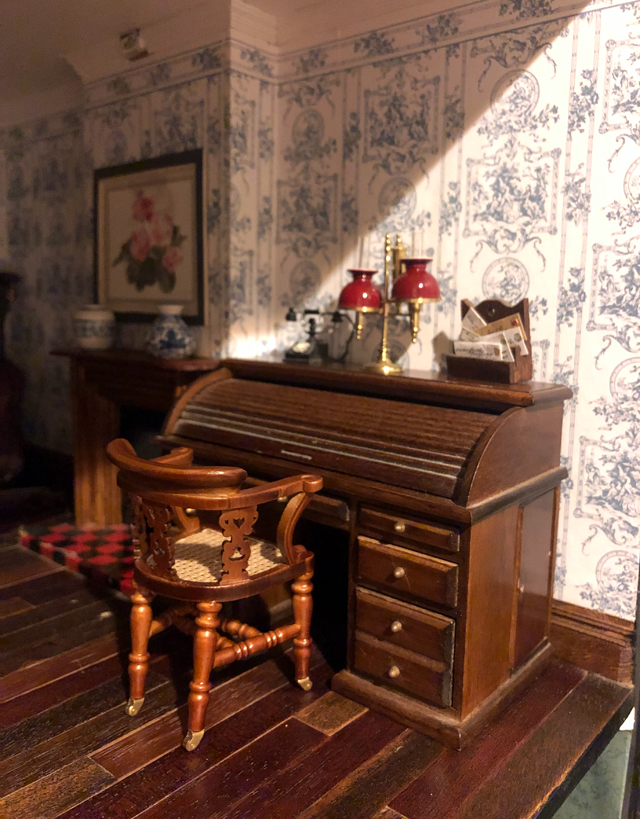
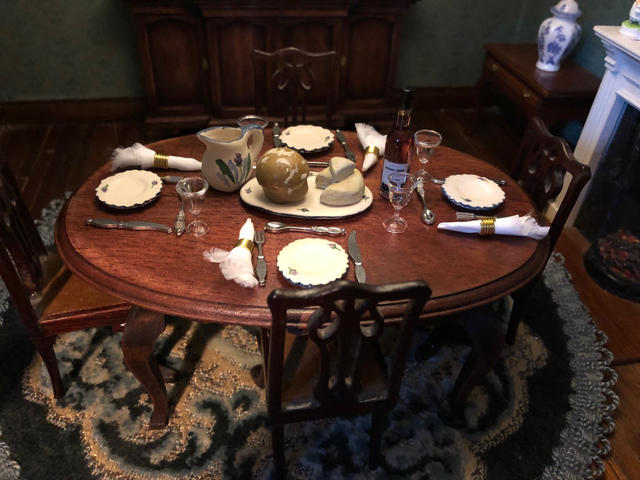
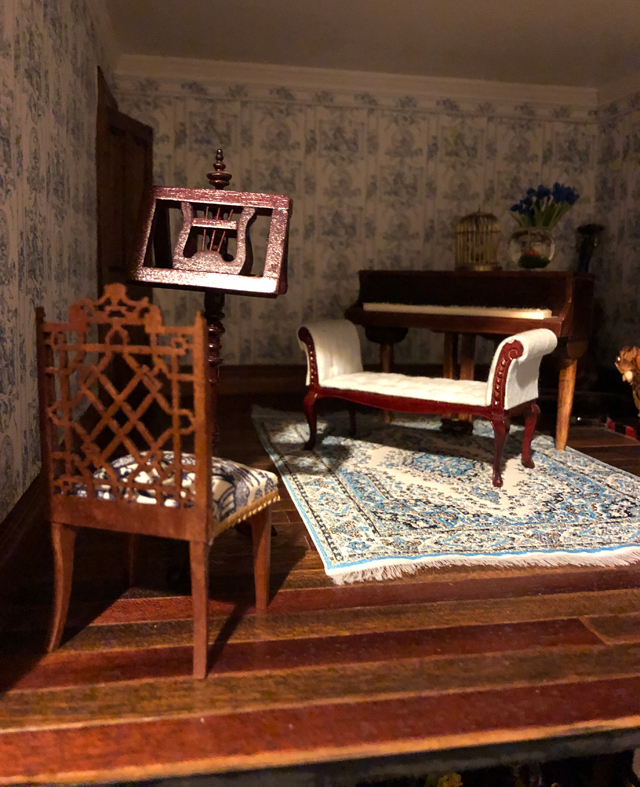
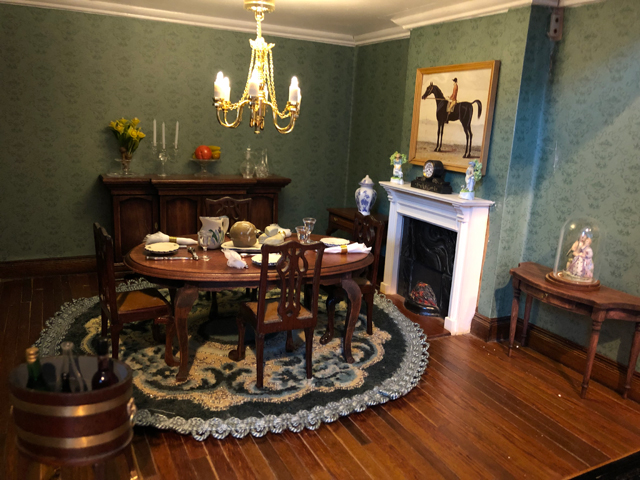
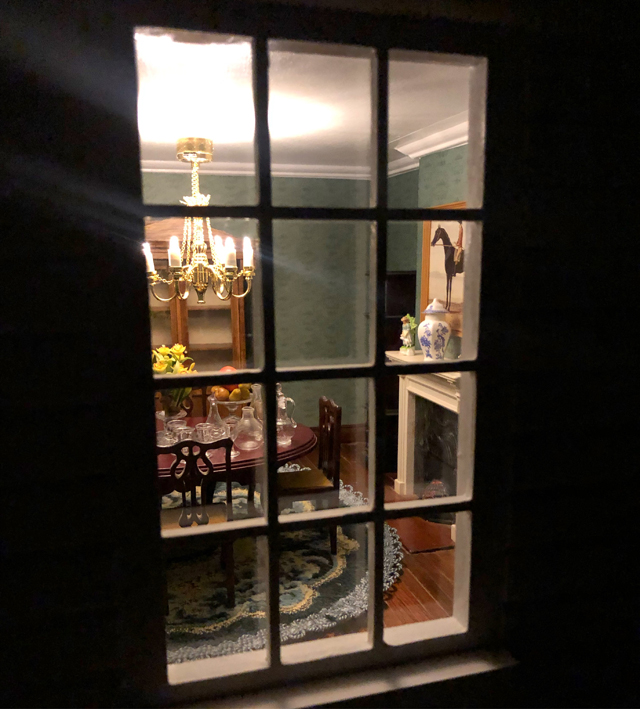
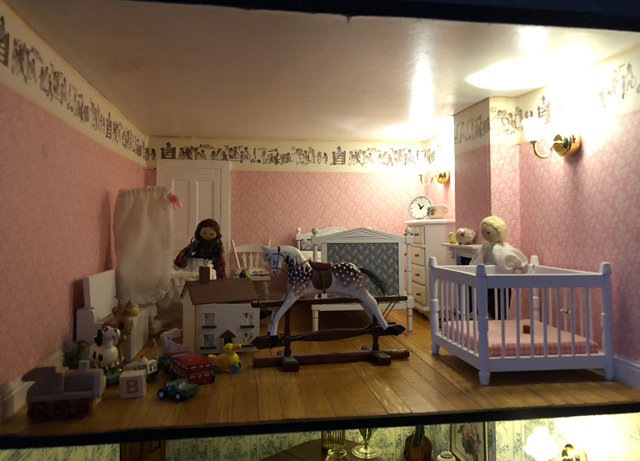
I have become so obsessed, that I also ordered some tiny kit furniture from Germany, and with my own hands made a new sideboard for the dining room, plus a dining table, side table and grandfather clock. I sanded and stained and varnished and glued them together. It’s the most crafty thing I have ever done. I am also currently working on a mini Georgian sampler, meticulously cross-stitching teeny tiny stitches on the smallest canvas known to womankind (and swearing about it a lot).
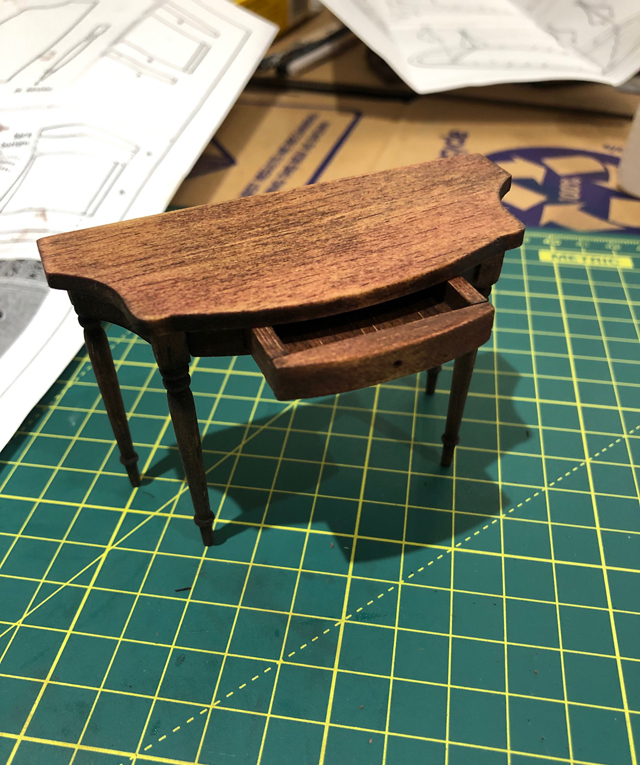
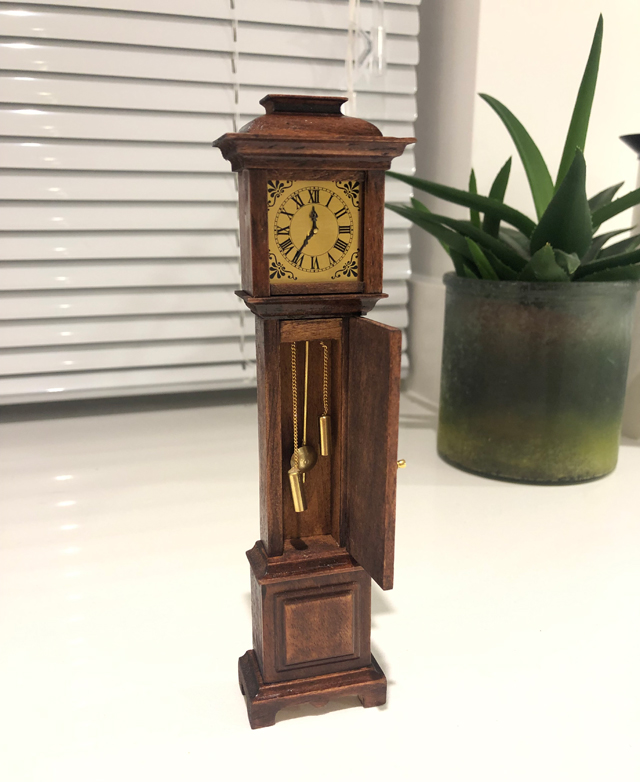
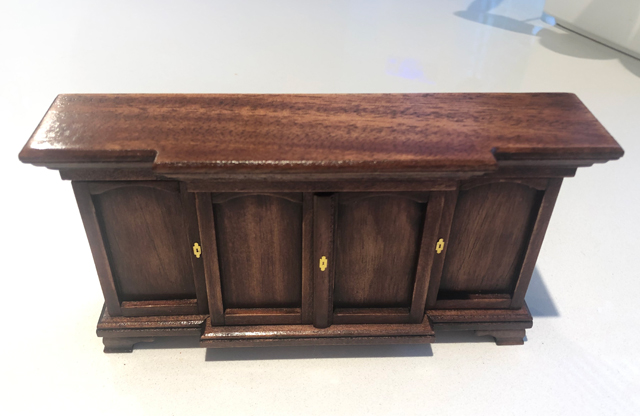
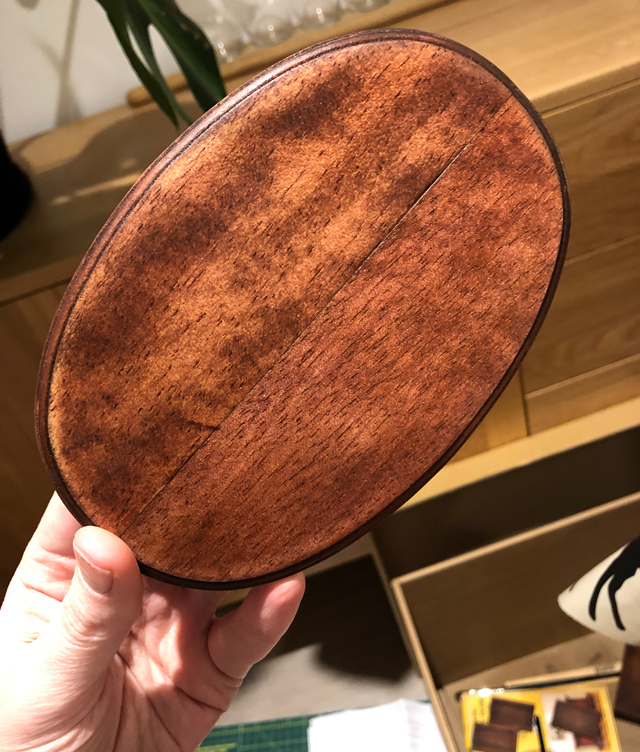
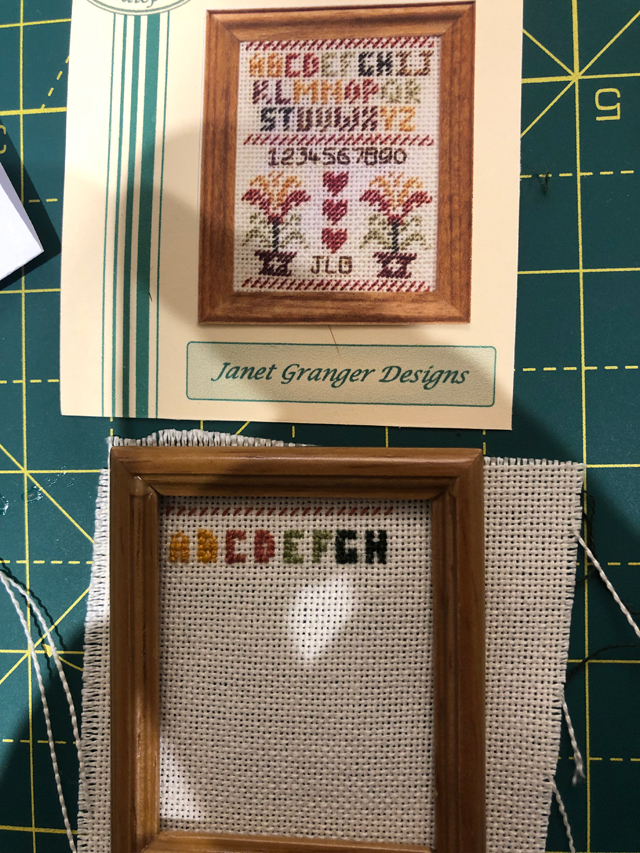
I was telling one of my oldest friends about the dolls house (let’s be honest, I’m telling anyone and everyone) and she said she thought the reason I loved it so much was because I was in complete control of it. Because as a writer, she said, I had so little control. Of course, writers have control over their output, but whether or not the book will be published, whether or not it will sell more than a handful of copies, whether or not it will be well received… all these things are completely out of our hands. Whereas in my teeny tiny perfect miniature world, I am God, and what I say goes.
“the thing I have loved so much is making things with my hands. And – most importantly of all – being away from a screen.”
She may be right. I am sure there’s an element of that in it. But also, for me, the thing I have loved so much is making things with my hands. And – most importantly of all – being away from a screen. I have spent my working life staring at a computer screen, and it’s horrible – the most unhealthy, lonely, lethargic way to spend your time. But at 7pm each night, once Daphne is in bed, I sit down at the dining room table (much to Oli’s consternation – he objected a LOT to the smell of wood stain in the kitchen) and I fiddle with my teeny bits of wood, and I (sometimes) drink a gin and tonic and I forget everything else. And it’s pure heaven.
You can find out more about THE RIVAL here, and order here if you want to make my day. UNFOLLOW ME will be published in June.















